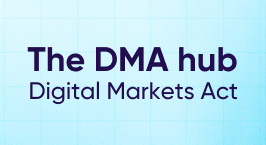
Why unbiased measurement in 2024 is key in the age of privacy, AI, and 1st party data

Having the same lawyer for both sides? Being the judge in your son’s spelling contest? Relying on biased measurement? If all three seem illogical, that’s because they are, but only the latter actually happens in real life for some advertisers…
The principle of unbiased measurement has been at the forefront of AppsFlyer’s journey: we’ve been talking about it for almost a decade now, in 2015, 2018, and 2021.
At its core, it’s always been about inherent conflicts of interest in the app marketing space: whether a media company that provides attribution services, or a measurement business that has a data monetization arm. Representing advertisers comes with great responsibility and there can be no deviations off course.
But in 2024 and going forward, being independent and unbiased has never been more important. Here’s why.
5 reasons why you need to have an independent and unbiased partner in your corner
Data, particularly 1st party data, is the new currency, and therefore it must be handled with extreme care by a trusted and unbiased entity. Your data must be protected because that’s what users deserve and privacy regulations demand; and because you must safeguard your competitive advantage and ensure that it is not indirectly used by your competitors.
Playing on both sides is highly risky for marketers: when a media company, an app company, and a measurement platform are all part of the same business, the potential for conflict of interest is elevated. The same holds true when a data monetization business is run in parallel to measurement.
On top of these risks, 2024 realities carry even greater weight when it comes to issues related to data accuracy, trust, privacy and unbiasedness.
1) Trust goes a long[er] way in the privacy era: In a data-driven world, a major pillar in trust stems from data accuracy. But the reality is that privacy-led regulations and restrictions have resulted in data minimizations. The completeness of raw data has been compromised, but filling the gaps is a complex undertaking, which in turn leads to a heightened risk of data misinterpretation.
But even if various solutions like modeling are solid (more on this ahead), it still leaves us with multiple and fragmented data sources and no single source of truth to go by. Here too tech heavy lifting is required to combine several sources into one by identifying and and removing duplicates, filling missing data/gaps in geos, web-to-app, longer LTV, organic, remarketing etc.
In the absence of a single source of truth, accuracy, or to be exact lack of accuracy, becomes a major issue, leading to reduced trust.
In short, reaching a level of confidence and trust in the accuracy of data in 2024 is no easy ask and no easy task. But there can be no compromise.
2) 1st party data comes 1st: Privacy data protection, at its core, seeks to place far greater control on the passage of data between different companies through increased transparency and clear user consent. As a result, the use of 3rd party data is rapidly declining, while 1st party data, which has always been a high value asset, has become more important than ever in the privacy era.
Because attribution companies often measure this data for their clients, ensuring it is not used in any way, shape, or form other than its intended use is paramount. Treasurers must be safeguarded and handled by a trusted entity. Here too, there can be no compromise.
3) Handle AI with care: Being unbiased in 2024 is crucial when leveraging such a powerful tool as AI which leads to disruptive change. What AI does is that it gives modeling a 100x boost, which is vital when we understand that models are more important than ever because of the need to fill in the gaps left by privacy-led data minimizations. Models must therefore be completely trusted and unbiased.
There are many ways to leverage AI, and many more are being developed. For example, AppsFlyer’s Creative Optimization is driven by AI to identify scenes and elements within a creative to allow for hyper granular creative measurement and optimization. Ensuring that the models that were built based on your data are not used for other purposes is cardinal.
4) Privacy-led innovation: An unbiased positioning is a must-have when we’re dealing with innovation and adoption of frameworks such as SKAdnetwork (SKAN) and Privacy Sandbox. It requires strong partnerships with big tech companies like Apple, Google, and Meta, as well as with ad networks, DSPs, SSPs, publishers, mediation suppliers, and agencies. Perhaps the single most important element that is at the basis of these partnerships is, you guessed it, trust or being unbiased. Without it, true innovation is impossible.
5) Industry-wide innovation: Being unbiased is also the only way to innovate in an environment where the only true constant is change. For example, our recent enriched engagement type protocol, which redefines how campaigns are being measured by going well beyond the current and flawed view of looking only at impressions and clicks. Clearly, only really an unbiased party can push the ecosystem together with such significant ad experience and attribution changes.
The bottom line: Trust, independence, and being unbiased redefines the meaning of partner
In 2024, when data is king, when privacy is turning measurement into a more block-box and even an art driven by models, when the marketing stack is becoming AI first, your measurement partner has to be a true partner.
But what does that actually mean? Well, a true partner means an entity you fully and completely trust. To trust someone in our industry, you must have confidence that your data is a) accurately measured thanks to the best technology that can untangle a complex measurement reality, and b) that your partner is independent and unbiased.
In the age of privacy, AI, and 1st party data, the role of a measurement partner is changing. Its position in the marketing stack is more important than ever: it completes missing data points, generates realities, runs your models, it’s in charge of scaling your campaigns, it creates new standards in the ecosystem, and more. For all of the above, there is only one thing more important than the quality of service — trust. Your trust that this central piece of your stack has only one interest: your own growth.





